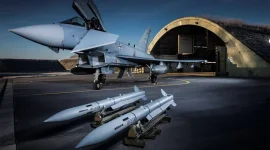- Views: 1K
- Replies: 12

The Indian Air Force (IAF) is considering a significant shift in its maintenance strategy for the F404 engines that power its Tejas Mk1A fighter jets. With a major expansion of the Tejas fleet on the horizon, the IAF is exploring the possibility of outsourcing engine maintenance to private sector companies.
This move comes as the IAF prepares to place orders for over 97 additional Tejas Mk1A jets by the end of the year, adding to the existing fleet.
Currently, the F404-IN20 engines, sourced directly from GE Aerospace, are maintained exclusively by the IAF. However, the anticipated surge in the Tejas fleet, projected to reach nearly 200 Mk1A and Mk1 jets in the next 7-8 years, presents a significant maintenance challenge.
Maintaining over 250 F404-IN20 engines to ensure high operational readiness may overwhelm the IAF's existing squadron-level MRO facilities.
To address this, the IAF is contemplating a new approach where private sector companies would establish dedicated MRO facilities for the F404 engines. This would involve the IAF procuring spares and consumables directly from GE Aerospace, while Hindustan Aeronautics Limited (HAL), the manufacturer of the Tejas Mk1A, would not be directly involved in engine maintenance.
This potential shift offers several advantages. Private sector participation could boost capacity and introduce specialized expertise, potentially leading to cost savings and improved efficiency in engine maintenance. Furthermore, it could stimulate growth within India's private aviation sector.
The IAF's decision to consider private sector involvement in F404 engine MRO is still under evaluation. A thorough assessment of the potential benefits and challenges is crucial before a final decision is reached.
However, if implemented, this move could have a profound impact on the Indian defence industry and the future of the Tejas fighter jet program. It aligns with the broader trend of increasing private sector participation in defence manufacturing and maintenance, aiming to enhance self-reliance and efficiency.




